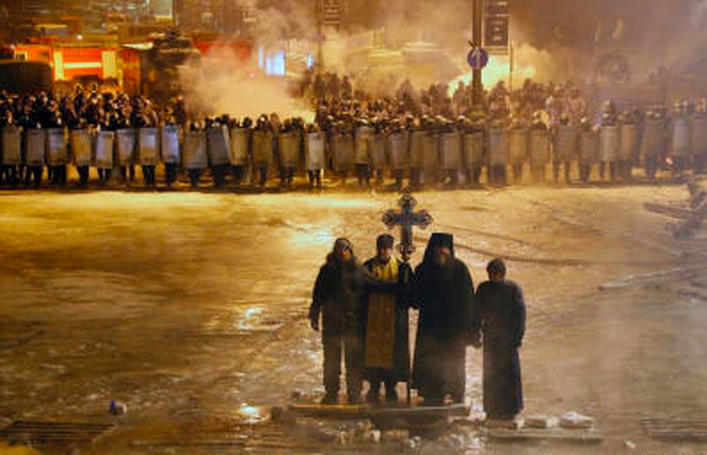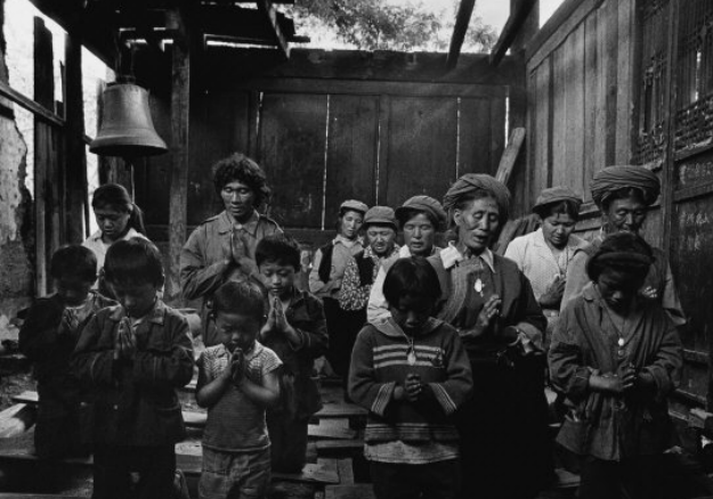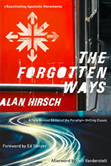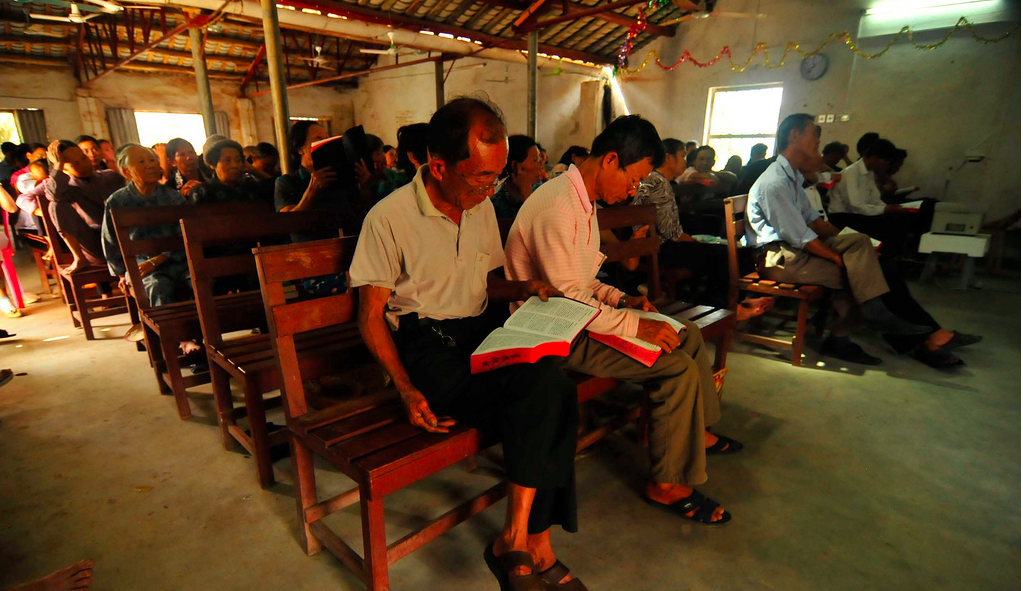 Some people take advantage of crisis for the power they might gain. Some take advantage of crisis to focus on what's important. Some . . . to really listen (or at least well or better than before the crisis). I claim no insight into God's mind and maybe, I'm the only one, but I have been thinking a lot lately as I have been shopping for COVID-19 survival items for my congregation (if anyone needs something) or for my neighbors . . . some early morning pondering . . . So, here's a few things that have been on my mind lately: ☛ This crisis has not caught God by surprise (a cliché, but still true) ☛ Our most vulnerable are truly vulnerable at this time, and that should concern churches ☛ I am way too political (i.e., politically thinking, that is)--and I wish socially minded Christians would stop telling me the gospel is political, which drives us to party politics, not church, not Jesus ☛ Church is easy(er) when we are not facing non-ordinary times; these are non-ordinary times ☛ This non-ordinary time is normal times for much of the global church ☛ Church leaders have not prepared Christians for trying times (well, at least, I have not done as good of a job as I should have–but that doesn't grow churches well these days) . . . and Christians have let the leaders not prepare them for trying times ☛ No matter how temporary this COVID-19 crisis is, it shows us (or should show us anyway) that things for the church can change on a dime (and fast) ☛ Whatever this COVID-19 crisis is, I am convinced this is a test of faithfulness, not only faithful to Jesus, but also a test of faithfulness to church–-not just church in general, but faithfulness to a local church, your particular body of believers ☛ We (i.e., Christians and church leaders) have been counting on the trusted institutions of Christendom to help us maintain the way we do church ☛ We have a poor imagination for doing church, which is a barrier for reaching the lost (i.e., the unchurched). Okay, I've been thinking a lot.
0 Comments
I am reading an article called “The Nothingness of the Church Under the Cross: Mission without Colonialism” by Ry O. Siggelkow. Two things strike me right away in reading this article, especially since I have been thinking about this myself in recent years: First, the author says what is at stake is the very question of the truth of the gospel itself and the extent to which the presence of Christian mission and western colonialism marks nothing less than a denial of the gospel. Furthermore, any theological study, it seems, needs to also understand the theological conditions by which the gospel itself became “bound theologically, ideologically, and practically to established powers” (e.g., institutions, the state, educational processes, business success, and of course affluent and status-ed people—my list of “powers” not Siggelkow's; he doesn’t id the powers except for the implications of the word “colonialism”). The author writes that the question, then, of mission, today, is what is mission now in a post Christendom context. I would say, rather, now it is understanding mission, not so much in a post-Christendom context, but rather in a context in which the church and its institutions are seeking to only partially free itself from only parts of Christendom. Second, in the long stretch of history we have seen the diminishing of what is evident in the NT, namely the parousia. Some call this the second coming of Jesus. I will call it the “apocalyptic expectancy and hope” (as does the author) of the imminent coming of Jesus. This expectancy and hope is solely lacking and, in some minds, has for all practically purposes vanished. So, we have exchanged the expectant hope of Jesus’ second appearing in the fulness of his kingdom with political visions (right and left, we all do this, even the woke). The “slacking of apocalyptic expectancy and hope” has made church leadership, and as a result, the church—at least in the western American church—dependent on the systems and structures of Christendom. Those that rant against Christendom, however, are selective, nonetheless, as to which parts of Christendom (i.e., to which aspects of its systems and structures and institutions) are ranted against and those that are passively accepted and/or embraced. This is to some, a matter of survival, especially for those invested in such Christendom systems and institutions. Yet, as far as I can tell, the NT doesn’t teach us to do what it takes so the church survives; the NT teaches us to be church and expect the Lord Jesus to return–and to act, suffer, and endure accordingly. An apocalyptic gospel is always destabilizing, both for the institutional church (local or otherwise) and, as well, society (for which many/most Christians form their identity, seek stability, and pump up their status). No wonder a threat to Christendom is a threat to much of the church (and its institutions) and to us, our social and cultural us. In part, this is what made the world-turn-up-side-down at the birth of the church, at least until Constantine aligned the state and the church together. (Presto, Christendom was born!). Some thoughts to make us rethink church. *This post incorporates some of the words and phrases used by the author of the article and deserves a thread of footnotes. But the thoughts and conclusions are mine, of which I take responsibility for.
 I don't smoke cigarettes . . . I don't go to the movies or the theater . . . I don't attend secular concerts . . . don't drink coffee . . . go to the beach . . . go dancing . . . fill in the blank. These lines and words are familiar to most evangelical and, especially, conservative Christians. Somehow these lines have been incorporated as a part of our idea of sanctification and how we take a stand against the world–in reality how we define ourselves and the world we oppose. For most of my Christian life I had understood some certain behaviors and places, some types of entertainment, and of course houses of ill repute were sinful, evil, and down-right ungodly–and no Christian should go or participate in such. There is a temptation, however, without some careful thought, biblical understanding, and wisdom, to identify certain activities and venues as evil, ungodly, and "pagan" (unChristian) in and of themselves–almost "just because" (and then attach a Bible verse). There is a tendency among us to simply think the early church condemned certain pagan and civil practices, prostitution, and entertainment because, somehow, such places and behaviors were inherently evil and ungodly. Don't worry, I haven't changed–much–on this thinking, but . . . consider where we might be missing the biblical (i.e., the gospel) point. I won’t dispute the notion entirely, but we need to ask why, what makes them evil and ungodly? In early Christianity, Nero (54–68) had accused Christians of being haters of mankind. Tacitus, a Roman senator and historian (c. 56 – c. 120), reflecting on Nero's post-Rome-burning activities, wrote in his Annals (c. 116):
Nero's indictment of the church caught on. The gathered-church and Christians were accused of being haters of mankind and antisocial (i.e., did not participate in the approved and appropriate Roman social activities). However, it wasn't just because there was something inherently evil, pagan, or sinful in pagan temples (of course idolatry is bad in any form), Roman theaters, religious brothels (there were no other at that time–really), and after-supper symposium entertainment (which included orgies, dancer-strippers, prostitution, and, as well, sexual encounters between adult men and pubescent or adolescent boys). The accusations had more to do with who was welcome at their table (literally), who made up the gathered-church, and how their faith (the gospel and the work of the cross) now defined the concept of being human. These "pagan" practices and venues were antithetical to the nature of the church and who was welcome to participate at the common meal, the Lord's table, and in baptism. The Christian community began to abstain from such activities–and their abstention and their gathering together as church was a challenge and a display of condemnation–because in the gospel and as a result of the cross, the leveling of humanity began to be practiced by the church (i.e., its habitus as a gathered-people). Children (boy and girls), women, slaves, and individuals of differing social, economic, and work classes took on new meaning, new intrinsic value, new dignity to each other "in Christ." Not all human beings were considered equally human or human at all. There was most definitely tiers of human hierarchies that placed a vertical understanding of people, human caste, occupations, age, gender, and ethnicity. When Christians were accused of repudiating and eschewing religious and pleasure practices and institutions of its day—i.e., the theater, temple prostitution, races, gladiator combat, household symposium entertainment—they did so primarily because these venues supported, displayed, and maintained the social and cultural tiers of human hierarchy (now that was and is evil)—not simply because somehow these things were inherently evil. They were venues and practices that supported and maintained social and cultural habits that were inherently racist, misogynistic, de-humanizing, child-abusive, women-abusive, enslavement (i.e., slavery), and thus maintained the evil and ungodly tiers of human hierarchy. All this was challenged by the gospel revealed in the cross and displayed by the gathered-church. This is why the early church was hated. They were accused of hating mankind and of being antisocial because the gathered-church by its very nature and habitus (i.e., how a church practiced being church and how that translated into daily, mundane life and human associations) challenged the status quo of the tiers of human hierarchy. This scared, frighten, and unsettled the gate-keepers, definers, and powers of the social order. I think, today, we're missing this element of a church's presence because of our Christendom-dependent, politically-aligning, homogenous, building-centered church experience doesn't create church in the same way the New Testament and early church was formed and acted. Through who we are as church and how we do church (in much of Christendom today), we have no power to challenge the very places and practices of racism, misogyny, child and women abuse, slavery (of any kind), and any form of de-huminzation of any gender, age, class, or person. Perhaps, it is time and appropriate to reconsider how we do church. For a thread on the nature of the gathered-church as God's platform for addressing and challenging the tiers of human hierarchy >> The Seditious gathered-church.
 After 35+ years reading the Bible, knowing Greek fairly well so I able to read and interact with the New Testament Greek text, having memorized and studied much of the NT (for personal, ministry, and academia), and doing my best to listen to the text (I am an exegete foremost) as well as I can, getting past as much as possible the cultural, institutional, and Christendom lenses that cause me to be socially safe, institutionally protective, and (I know some hate when this is pointed out) Western, I have come to understand that we might not have the capacity to fully grasp how culturally, socially, and institutionally subversive the gospel (itself) and the writings of the New Testament truly are. Sorry for the long sentence. But, I am becoming more and more undone by the New Testament each time I approach it. I am laid bare before the Word. I am floored now to think of what, say, the apostle Paul went through to convince and demonstrate love for those in a polytheistic culture, whose understanding of what “others” (non or lesser) human beings were, and a civilization of people who were so far removed from the meaning of Jesus’ death on that cross. Multiple imprisonments. Countless beatings. I can’t even imagine the forty lashes he endured on a number of occasions—for the sake of the gospel and the sinful, corrupt, ignorant, racist, dehumanizing . . . the unaware. The stoning and being left for dead. Never to walk or stand the same again—ever. Shipwrecked. And set afloat on the wreckage for days. Sleeping on the roadside. Wondering if robbers were about. When sleep was even possible. Hunger. Thirst. Exposure. All for the love of Christ and those needing the gospel (2 Corinthians 6, 11, 12). I cannot imagine this in my safe, Christianized world. I am now unsure whether we, whether I, frankly, follow in these footsteps as we should be (“Brothers, join in imitating me, and keep your eyes on those who walk according to the example you have in us,” Phil 3:17). I fear we have more so become, as Paul told us with tears, “enemies of the cross of Christ” (Phil 3:18), whose “god is their belly, and they glory in their shame, with minds set on earthly things” (v. 19). I wonder if we, if I, truly believe that “our citizenship is in heaven," and whether we truly “await a Savior, the Lord Jesus Christ, who will transform our lowly body to be like his glorious body, by the power that enables him even to subject all things to himself” (vv. 20-21). I think I'd live so very differently, if I truly believed this. I am now so amazed--aghast, is really the word—that we have so succumbed to the ways we do things as church in the western march of Christendom that we cannot fathom church any other way than how we experience church now. I am equally aghast at my own shallow level of understanding the gospel that leaves me safe and privileged. I am undone at my own inability to fathom what Jesus meant when he commanded that we “love one another.” I am humbled to think I have not made the link that Paul made from the cross, the death of Jesus, to the reconciliation implied by the power of the blood (Ephesians 2:11-22). I am so protected from the subversiveness of the gospel and rest way too easily in knowing I have my ticket to heaven. I have a safe Christianity. A safe discipleship. A safe gospel. And, a safe ecclesiology (i.e., a safe church).
At nearly 60, I am re-learning (maybe re-hearing and listening better is a better way of saying it) what Paul wrote to the church at Philippi while in chains for the gospel in some jail cell: “But whatever gain I had, I counted as loss for the sake of Christ. Indeed, I count everything as loss because of the surpassing worth of knowing Christ Jesus my Lord. For his sake I have suffered the loss of all things and count them as rubbish, in order that I may gain Christ and be found in him, not having a righteousness of my own that comes from the law, but that which comes through faith in Christ, the righteousness from God that depends on faith—that I may know him and the power of his resurrection, and may share his sufferings, becoming like him in his death, that by any means possible I may attain the resurrection from the dead.
At the dawning of my 60th year, I hear again Paul. So easy to forget what lies behind when what lies ahead is basically more of the same that has kept me safe, Christianized, and somewhat well fed and sheltered. Altogether different in a jail cell for the real gospel that compelled him to strain forward to what lies ahead--more jail cells, beatings, and death for those who need the gospel. “Not that I have already obtained this or am already perfect, but I press on to make it my own, because Christ Jesus has made me his own. Brothers, I do not consider that I have made it my own. But one thing I do: forgetting what lies behind and straining forward to what lies ahead, I press on toward the goal for the prize of the upward call of God in Christ Jesus. Let those of us who are mature think this way, and if in anything you think otherwise, God will reveal that also to you (Philippians 3:4-11). This is what I am thinking, praying . . . I know what needs to be forgotten . . . wondering what lies ahead.
"We can no longer afford our historical sentimentality to the past. Christendom is not the biblical mode of the church. It was/is merely one way in which the church has conceived of itself. In enshrining it as the sole form of the church, we have made it into an idol that has captivated our imaginations and enslaved us to a historical-cultural expression of the church. We have not answered the challenges of our time precisely because we refuse to let go of the idol. The answer to the problem of mission in the West requires something far more radical than reworking a dated and untenable model. It will require that we adopt something that looks far more like the early church in terms of its conception of the church (ecclesiology) and its core task in the world (missiology)." ~ Michael Frost & Alan Hirsch, The Shaping of Things to Come Over the last year I have been reflecting on and learning about the failing and cracking of christendom, the structures, privileges, and cultural alignments that allow Christianity to have a central social acceptability and place in our western world. Part of my reading has been on the impossible increase and spread of early Christianity after Acts, the first 300 or so years of church history. A current author, sees a parallel with the exploding Chinese church. Here is his reflection on the Chinese church through the lens of the early church:
|
AuthorChip M. Anderson, advocate for biblical social action; pastor of an urban church plant in the Hill neighborhood of New Haven, CT; husband, father, author, former Greek & NT professor; and, 19 years involved with social action. Archives
February 2024
Categories
All
|
Pages |
More Pages |
|





 RSS Feed
RSS Feed